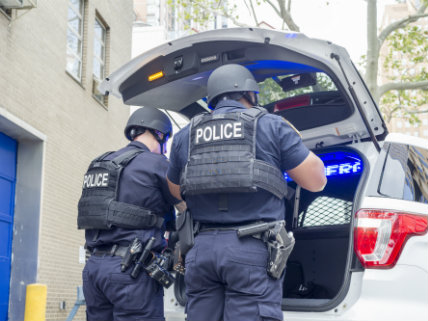NYPD Sued for Refusing to Reveal Data on Millions in Asset Forfeiture Revenue
Public records show the NYPD collected $6 million in asset forfeiture revenue in 2013, but a new lawsuit is seeking more info.


The New York City Police Department is stonewalling a records request for information on how it collects and distributes "tens of millions" of dollars in seized cash and property under asset forfeiture laws, according to a lawsuit filed Thursday by Bronx Defenders, a legal aid organization that assists low-income people.
The lawsuit, first reported by the New York Daily News, says the NYPD dragged its feet for a year and half before inadequately responding to a 2014 public records request by Bronx Defenders for the department's policies and procedures for seizing property under forfeiture laws.
And when the NYPD finally handed over the documents, after several delays and extensions, the response consisted merely of 14 pages of accounting summaries and copy of the NYPD patrol guide.
However, the scant records the Bronx Defenders got back show that the NYPD reported more than $6 million in revenue in 2013 from seized cash, forfeitures, and property sold at auction. The NYPD had a balance of more than $68 million in seized currency in any given month of that year, according to the documents.
Adam Shoop, the lead attorney for Bronx Defenders in the case, said that, of the $6 million, only $1 million was collected through auctions or completed forfeiture actions. The rest, it appears, was simply seized and never recovered by the property owners, Shoop said.
"Based on my experience, part of the reason would be there's a really byzantine scheme of hoops people have to jump through to get their property back," Shoop said.
One bit of data the NYPD does publicly release is "unclaimed cash and property" sales, which totaled $6.5 million in 2014 and more than $7 million in 2015, according to the lawsuit.
Bronx Defenders filed the request in light of a 2014 Gothamist investigation revealing the hardships people in New York City face in retrieving their seized property:
In the middle of the night in March of 2012, NYPD officers burst into the Bronx home of Gerald Bryan, ransacking his belongings, tearing out light fixtures, punching through walls, and confiscating $4,800 in cash. Bryan, 42, was taken into custody on suspected felony drug distribution, as the police continued their warrantless search. Over a year later, Bryan's case was dropped. When he went to retrieve his $4,800, he was told it was too late: the money had been deposited into the NYPD's pension fund. Bryan found himself trapped in the NYPD's labyrinthine civil forfeiture procedure, a policy based on a 133-year-old law which robs poor New Yorkers of millions of dollars every year; a law that has been ruled unconstitutional twice.
"They do this all the time, to so many people I know," Bryan, a bartender of 21 years, told us in the office of the Bronx Defenders. Before the raid, he had planned on using the cash to take his girlfriend on a cruise. "A lot of people, when they get arrested, they know that their money is just gone, and they know that the police are taking it to enrich themselves."
Shoop said the NYPD's more than 300,000 arrests a year, the majority of them for low-level offenses under the "broken windows" model of policing, are a major driver of seizures.
The Bronx District Attorney announced last week that it would be streamlining its process for citizens to retrieve their seized property in response to another Bronx Defenders lawsuit, which alleged that the NYPD Property Clerk held seized property for much longer after arrests than the 15 days mandated by the city's rules.
Meanwhile, New York City Council member Ritchie Torres introduced a bill last year, expected to be discussed this September, that would require the NYPD to release annual data on seized property.
The NYPD is notorious for stonewalling public records requests and generally flouting state transparency laws. For example, I've had requests for weapons discharge reports denied, even though they were declared public records by a state appeals court in a previous lawsuit. I also had a request for officer reports of stolen and lost guns denied because they were deemed "personnel records." The NYPD even once claimed that its Freedom of Information handbook was exempt from freedom of information requests.
The NYPD did not immediately respond to a request for comment.
Editor's Note: As of February 29, 2024, commenting privileges on reason.com posts are limited to Reason Plus subscribers. Past commenters are grandfathered in for a temporary period. Subscribe here to preserve your ability to comment. Your Reason Plus subscription also gives you an ad-free version of reason.com, along with full access to the digital edition and archives of Reason magazine. We request that comments be civil and on-topic. We do not moderate or assume any responsibility for comments, which are owned by the readers who post them. Comments do not represent the views of reason.com or Reason Foundation. We reserve the right to delete any comment and ban commenters for any reason at any time. Comments may only be edited within 5 minutes of posting. Report abuses.
Please to post comments


Aaarrrrrr, we not be givin' away ar secrets, matey....
Which makes me think of the South Park episode were Cartman becomes the leader of a group of pirates. One of my favorites.
I've had requests for weapons discharge reports denied, even though they were declared public records by a state appeals court in a previous lawsuit. I also had a request for officer reports of stolen and lost guns denied because they were deemed "personnel records."
Look on the bright side, keep up you harassment of the NYPD and I'm sure you'll get an insider's view of the things soon enough.
NYPD seems to be corrupt through and thorough and yet,they are praise as the 'finest on CNN,FOX and even at times MSNBC. The amount of cop sucking on the news is disgusting.
"Based on my experience, part of the reason would be there's a really byzantine scheme of hoops people have to jump through to get their property back," Shoop said.
Seems like a good specialty for NYC attorneys to get into.
If their clients could afford the legal fees, that is.
That's what is so infuriating about civil forfeiture, apart from it being a blatant violation of the 5th amendment. The average value of seized property is lower than what it would cost to fight for it back.
"Based on my experience, part of the reason would be there's a really byzantine scheme of hoops people have to jump through to get their property back," Shoop said.
According to human rights activist, Eric Holder, this is "due process".
The Bronx District Attorney announced last week that it would be streamlining its process for citizens to retrieve their seized property...
I'll refrain from holding my breath.
I think it's about hiding the 'stream' of cash better.
Meanwhile, New York City Council member Ritchie Torres introduced a bill last year, expected to be discussed this September, that would require the NYPD to release annual data on seized property.
Or else what?
The cops will hold your breath until you turn blue.
+1 this is a fact
+1
i get Paid Over ?80 per hour working from home with 2 kids at house. I never thought I would be able to do it but my best friend earns over ?9185 a month doing this and she convinced me to try. The potential with this is endless.
Heres what I've been doing,.......... http://www.CareerPlus90.com
Sheesh only 6 mil. given the size of NYC that seems... small... it would appear that most of the asset forfiture never even gets to the city coffers. Huh?
You gotta cast a wide net to pull a big haul. Fishing 101.
tony soprano would be proud of their racket